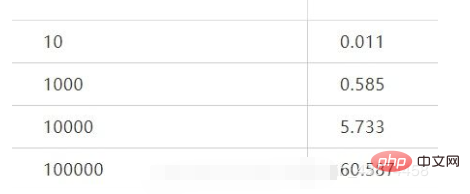PHP inserts data in batches into mysql (code example)

Suppose I have such a table and I want to insert a large amount of data into this table
CREATE TABLE IF NOT EXISTS `user_info` ( `id` int(11) NOT NULL AUTO_INCREMENT COMMENT '自增主键', `name` varchar(255) NOT NULL default '' COMMENT '姓名', `age` int(11) NOT NULL default '0' COMMENT '年龄', PRIMARY KEY (`id`) ) ENGINE=InnoDB DEFAULT CHARSET=utf8 COMMENT='用户信息表';
Batch Insert
Method 1. Use for loop to insert
When inserting a small amount of data into mysql, we usually use for loop
$arr = [
[
'name' => 'testname1',
'age' => 18,
],
[
'name' => 'testname2',
'age' => 19,
],
[
'name' => 'testname3',
'age' => 18,
],
];
$servername = "localhost";
$port = 3306;
$username = "username";
$password = "password";
$dbname = "mytestdb";
// 创建连接
$conn = new mysqli($servername, $username, $password, $dbname, $port);
// 检测连接
if ($conn->connect_error) {
die("connect failed: " . $conn->connect_error);
}
$costBegin = microtime(true);
foreach($arr as $item) {
$sql = sprintf("INSERT INTO user_info (name, age) VALUES ( '%s', %d);", $item['name'], (int)$item['age']);
if ($conn->query($sql) === TRUE) {
echo "insert success";
} else {
echo "Error: " . $sql . "<br>" . $conn->error;
}
}
$costEnd = microtime(true);
$cost = round($costEnd - $costBegin, 3);
var_dump($cost);
$conn->close();
If you want to insert a large amount of data in batches, there is no problem if you also use a for loop to insert, but it will take longer. Compare the time it takes to insert a small amount of data with a large amount of data. Use the above for loop to insert the time: number of items (unit: seconds)

Method 2: Use insert statement to merge and insert
In mysql, you can use insert statement to merge and insert, such as
INSERT INTO user_info (name, age) VALUES ('name1', 18), ('name2', 19);表示一次插入两条数据
$arr = [
[
'name' => 'testname1',
'age' => 18,
],
[
'name' => 'testname2',
'age' => 19,
],
[
'name' => 'testname3',
'age' => 18,
],
// 此处省略
……
……
];
$servername = "localhost";
$port = 3306;
$username = "username";
$password = "password";
$dbname = "mytestdb";
// 创建连接
$conn = new mysqli($servername, $username, $password, $dbname, $port);
// 检测连接
if ($conn->connect_error) {
die("connect failed: " . $conn->connect_error);
}
$costBegin = microtime(true);
if (!empty($arr)) {
$sql = sprintf("INSERT INTO user_info (name, age) VALUES ");
foreach($arr as $item) {
$itemStr = '( ';
$itemStr .= sprintf("'%s', %d", $item['name'], (int)$item['age']);
$itemStr .= '),';
$sql .= $itemStr;
}
// 去除最后一个逗号,并且加上结束分号
$sql = rtrim($sql, ',');
$sql .= ';';
if ($conn->query($sql) === TRUE) {
} else {
echo "Error: " . $sql . "<br>" . $conn->error;
}
}
$costEnd = microtime(true);
$cost = round($costEnd - $costBegin, 3);
var_dump($cost);
$conn->close();
Let’s take a look at the time comparison between a small amount of data and a large amount of data. From the overall time, it can be seen that insert merge insertion saves a lot of time compared to the for loop insertion just now, and the effect is very obvious. Number of times (unit: seconds)

If you think the array is too big and want to reduce the risk of SQL errors, you can also use array_chunk to cut the array into chunks of a specified size, and then Perform insert merge insertion for each block.
For more PHP related knowledge, please visit php tutorial!
The above is the detailed content of PHP inserts data in batches into mysql (code example). For more information, please follow other related articles on the PHP Chinese website!

Hot AI Tools

Undresser.AI Undress
AI-powered app for creating realistic nude photos

AI Clothes Remover
Online AI tool for removing clothes from photos.

Undress AI Tool
Undress images for free

Clothoff.io
AI clothes remover

Video Face Swap
Swap faces in any video effortlessly with our completely free AI face swap tool!

Hot Article

Hot Tools

Notepad++7.3.1
Easy-to-use and free code editor

SublimeText3 Chinese version
Chinese version, very easy to use

Zend Studio 13.0.1
Powerful PHP integrated development environment

Dreamweaver CS6
Visual web development tools

SublimeText3 Mac version
God-level code editing software (SublimeText3)

Hot Topics
 1386
1386
 52
52
 MySQL: An Introduction to the World's Most Popular Database
Apr 12, 2025 am 12:18 AM
MySQL: An Introduction to the World's Most Popular Database
Apr 12, 2025 am 12:18 AM
MySQL is an open source relational database management system, mainly used to store and retrieve data quickly and reliably. Its working principle includes client requests, query resolution, execution of queries and return results. Examples of usage include creating tables, inserting and querying data, and advanced features such as JOIN operations. Common errors involve SQL syntax, data types, and permissions, and optimization suggestions include the use of indexes, optimized queries, and partitioning of tables.
 PHP and Python: Comparing Two Popular Programming Languages
Apr 14, 2025 am 12:13 AM
PHP and Python: Comparing Two Popular Programming Languages
Apr 14, 2025 am 12:13 AM
PHP and Python each have their own advantages, and choose according to project requirements. 1.PHP is suitable for web development, especially for rapid development and maintenance of websites. 2. Python is suitable for data science, machine learning and artificial intelligence, with concise syntax and suitable for beginners.
 PHP's Current Status: A Look at Web Development Trends
Apr 13, 2025 am 12:20 AM
PHP's Current Status: A Look at Web Development Trends
Apr 13, 2025 am 12:20 AM
PHP remains important in modern web development, especially in content management and e-commerce platforms. 1) PHP has a rich ecosystem and strong framework support, such as Laravel and Symfony. 2) Performance optimization can be achieved through OPcache and Nginx. 3) PHP8.0 introduces JIT compiler to improve performance. 4) Cloud-native applications are deployed through Docker and Kubernetes to improve flexibility and scalability.
 Why Use MySQL? Benefits and Advantages
Apr 12, 2025 am 12:17 AM
Why Use MySQL? Benefits and Advantages
Apr 12, 2025 am 12:17 AM
MySQL is chosen for its performance, reliability, ease of use, and community support. 1.MySQL provides efficient data storage and retrieval functions, supporting multiple data types and advanced query operations. 2. Adopt client-server architecture and multiple storage engines to support transaction and query optimization. 3. Easy to use, supports a variety of operating systems and programming languages. 4. Have strong community support and provide rich resources and solutions.
 PHP: The Foundation of Many Websites
Apr 13, 2025 am 12:07 AM
PHP: The Foundation of Many Websites
Apr 13, 2025 am 12:07 AM
The reasons why PHP is the preferred technology stack for many websites include its ease of use, strong community support, and widespread use. 1) Easy to learn and use, suitable for beginners. 2) Have a huge developer community and rich resources. 3) Widely used in WordPress, Drupal and other platforms. 4) Integrate tightly with web servers to simplify development deployment.
 PHP: A Key Language for Web Development
Apr 13, 2025 am 12:08 AM
PHP: A Key Language for Web Development
Apr 13, 2025 am 12:08 AM
PHP is a scripting language widely used on the server side, especially suitable for web development. 1.PHP can embed HTML, process HTTP requests and responses, and supports a variety of databases. 2.PHP is used to generate dynamic web content, process form data, access databases, etc., with strong community support and open source resources. 3. PHP is an interpreted language, and the execution process includes lexical analysis, grammatical analysis, compilation and execution. 4.PHP can be combined with MySQL for advanced applications such as user registration systems. 5. When debugging PHP, you can use functions such as error_reporting() and var_dump(). 6. Optimize PHP code to use caching mechanisms, optimize database queries and use built-in functions. 7
 MySQL's Place: Databases and Programming
Apr 13, 2025 am 12:18 AM
MySQL's Place: Databases and Programming
Apr 13, 2025 am 12:18 AM
MySQL's position in databases and programming is very important. It is an open source relational database management system that is widely used in various application scenarios. 1) MySQL provides efficient data storage, organization and retrieval functions, supporting Web, mobile and enterprise-level systems. 2) It uses a client-server architecture, supports multiple storage engines and index optimization. 3) Basic usages include creating tables and inserting data, and advanced usages involve multi-table JOINs and complex queries. 4) Frequently asked questions such as SQL syntax errors and performance issues can be debugged through the EXPLAIN command and slow query log. 5) Performance optimization methods include rational use of indexes, optimized query and use of caches. Best practices include using transactions and PreparedStatemen
 The Enduring Relevance of PHP: Is It Still Alive?
Apr 14, 2025 am 12:12 AM
The Enduring Relevance of PHP: Is It Still Alive?
Apr 14, 2025 am 12:12 AM
PHP is still dynamic and still occupies an important position in the field of modern programming. 1) PHP's simplicity and powerful community support make it widely used in web development; 2) Its flexibility and stability make it outstanding in handling web forms, database operations and file processing; 3) PHP is constantly evolving and optimizing, suitable for beginners and experienced developers.




